By Lucy Komisar
Beckett‘s metaphor for the human condition, of people clutching to each other in the face of man‘s inhumanity to man, turns absurdity into tragedy and occasionally black comedy. Director Sean Mathias has staged, almost choreographed, a dazzling cast in a haunting performance of a poignant, classic play.
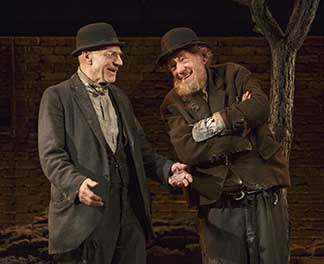
Gogo, diminutive of Estragon – that‘s French for tarragon — with bulbous nose and scraggly hair, is portrayed by the excellent Ian McKellen with a Lancashire accent. His jerky, unsteady motions show a man in physical decay.
Didi, diminutive of Vladimir, with a worn suit jacket that may reflect a lost self-image, is played with subtlety by Patrick Stewart, still more in charge of himself, still aware of the irony of their situation. He tells Gogo, “You’d make me laugh if it wasn’t prohibited.”
They are on a desolate road edged with rocks and holes and a single bare tree. They have been pals for fifty years and are now waiting for Godot, a personage who is never further identified, to save them from their desperation.
The horrors of society are represented by an abusive master and his willing slave who pass on their road. Pozzo (Shuler Hensley) — it‘s Italian, pronounced Potso — is a big man in boots and a cape. He‘s got a whip in one hand and a rope in the other. At the end of it is a sorry hunched-over man who drags a satchel and chair. His name, of course, is Lucky (a gut-wrenching, pitiful, excellent Billy Crudup).
Vladimir declares, “To treat a man . . . (gesture towards Lucky) . . . like that . . . I think that . . . no . . . a human being . . . no . . . it’s a scandal! Estragon adds: “A disgrace!”
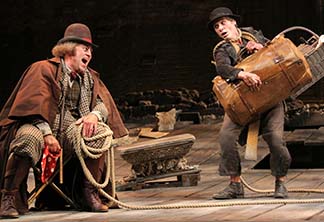
Lucky, still holding the bag, puts down a stool for his master to sit on. And Pozzo declares with irony soaked in a deep Southern accent, “You want to know why he doesn’t put down his bags? He explains, “He imagines that when I see how well he carries I’ll be tempted to keep him on in that capacity….. As though I were short of slaves!”
In Beckett‘s wonderful satire, Pozzo‘s voice breaks into a high pitch and he declares, “I am liberal. It’s my nature. (He jerks the rope. Lucky looks at him.) For I shall suffer, no doubt about that.”
Lucky dances to a crawl, wide-eyed, his mouth open. And, then on command, he “thinks.” He proclaims in rapid fire a lot of academic nonsense: “as a result of the labors left unfinished crowned by the Acacacacademy of Anthropopopometry of Essy-in-Possy of Testew and Cunard it is established beyond all doubt all other doubt than that which clings to the labors of men….”
And they depart.
A young boy (Colin Critchley) climbs out of a hole to say that Godot will not come today, but maybe tomorrow.
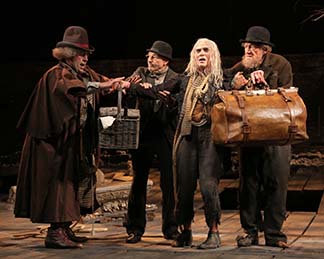
Will that be a great day? Tomorrow, there are a few leaves in the tree. Didi and Gogo do a little vaudeville dance. Gogo sashays. Won‘t things be fine?
But, the slave driver returns. He is a blind, broken old man. Has the world changed? Not at all. Lucky is still a willing slave. He is silent, because he went dumb one day. Slaves wordlessly take their masters‘ orders. This is a very political play.
Later, Didi says, “We have time to grow old. The air is full of our cries. But habit is a great deadener. … of me too someone is saying, He is sleeping, he knows nothing, let him sleep on.”
The genius of Beckett is that these men are not caricatures but human. The play is absurd, but everything in it is real. The ideas and politics are real, the depictions of human frailty and cruelty and power and misery are real.
It is sad, but also comic. Mathias knows when to lighten it, to run the vaudeville. And when to almost underplay the tragedy as the normal state of the world.
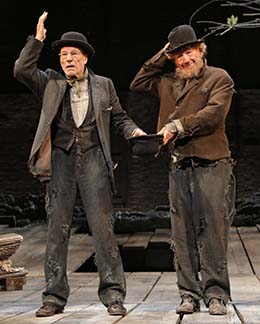
Unfortunately, some audience members, who come because of the famous stars, have been raised on TV sit-coms and laugh in all the wrong places, because they think they are supposed to. They don‘t know that Lucky falling down from weariness and abuse is not doing a slapstick pratfall.
Then there is the pronunciation question: how do you say Godot? In this play, the actors say GOD-oh. Americans say Ga-DOUGH, making it sound French. Neither is correct. Here is the true pronunciation on the best authority.
Helen Gary Bishop, a New Yorker, met Beckett when she ran the English language Studio Theater in Paris in the sixties and asked to put on one of his plays. She and her husband Tom Bishop, who became a Beckett scholar, were the playwright’s good friends for more than twenty years. In 1986, she made the documentary, Beckett: The Last Plays,” in French in Paris, while Beckett was directing four plays for one of the Beckett festivals she and her husband organized, this one to celebrate his 80th birthday.
She said, “Beckett always said ˜Go-Dough,‘ with equal emphasis on both syllables. He got a little testy when someone got the brilliant idea that ˜g o d‘ was really a stand-in for God and should be pronounced that way.
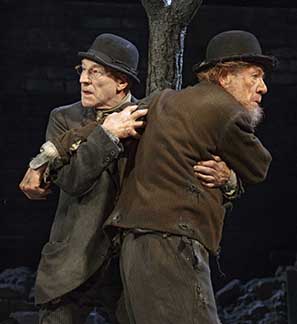
Beckett wrote “Waiting for Godot” in French. The English version followed. In French, Godot has nothing to do with God.
Bishop recalled, “He said that if he wanted to say God, he would have said God. If he wanted some kind of allusion to God, he would have found one when he did the French version.”
Offering another aperÒu which deepens one‘s appreciation of the play, she noted that Beckett loved the circus, and especially the Russian clowns who would come to France and perform regularly, much to his delight.
Bishop: “He said that unless the two homeless bums [in Godot] ˜clown around,‘ they are not being true to the essence of the play. They are clowning to keep themselves from going mad waiting for the help from Godot that will deliver them from the barren wasteland that is their life.”
A name like Godot is in keeping with a funky clown routine. Bishop said, Godot the Clown, I can see it now. And one has to admit that En Attendant Godot does have a side-show scan to it, as does Waiting for Godot. ˜Ladies and Gentlemen, we are waiting for the one and only Godot, who will be joining us any minute.‘”
Postscript from a NY Times article by Mel Gussow in 1989 at the time of Beckett‘s death at 83:
“Mr. Bishop has his own favorite Beckett story, about the pet dog he and his wife had named Beckett. They were too embarrassed to tell the author, but he found out through a mutual friend. Mrs. Bishop asked him if he was offended. Beckett said, ‘If the dog doesn’t mind, I don’t mind.’ ”
Waiting for Godot. Written by Samuel Beckett; directed by Sean Mathias. Cort Theatre, 138 West 48th St., New York City. 212 239-6200. Running time 2:30. Opened Nov 24, 2013; closes March 30, 2014. Samuel Beckett Today/Aujourd’hui articles on Beckett by Tom Bishop and others. (2/13/14) NY Theatre Wire review.

